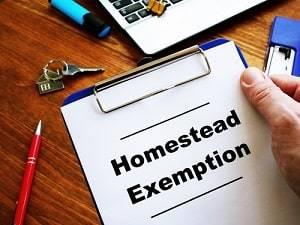Contact Our Firm
The use of the Internet or this form for communication with the firm or any individual member of the firm does not establish an attorney-client relationship. Confidential or time-sensitive information should not be sent through this form.
I have read and understand the Disclaimer and Privacy Policy.

UPDATE: How Can Florida’s Homestead Exemption Benefit Me?

Originally published: July 20, 2020 -- Updated: March 18, 2022
Update: Florida homeowners will want to understand exactly how the homestead exemption may be used in cases involving bankruptcy or foreclosure. The Florida State Constitution states that a property that is considered a homestead will be exempt from “forced sale” based on debts that are unrelated to the property itself. That is, a creditor who is seeking repayment for another loan, such as the balance on a credit card, may not place a lien on a debtor’s home. However, a mortgage lender will have the right to pursue foreclosure if a homeowner defaults on their loan. Unpaid property taxes may result in tax liens, and a mechanic’s lien may be placed on a home if a contractor is not paid for work performed on the property.
The homestead exemption will also apply in Chapter 7 bankruptcy cases. This type of bankruptcy may require a debtor to liquidate certain assets to repay debts owed to creditors before these debts will be discharged. Since a homestead is exempt from forced sale, a homeowner will be able to maintain ownership, as long as they are current on their mortgage payments. For those who have fallen behind on mortgage payments, Chapter 13 bankruptcy may be an option that will allow them to make up the past-due amounts and any related fees or other payments that are owed to the lender.
The homestead exemption will apply to a person’s primary residence, but not to other property they own, such as vacation homes. A property located in a city or municipality may qualify for the homestead exemption if it is up to half an acre in size, and properties outside of a municipality may be up to 160 acres. If you have questions about how the homestead exemption applies to you and how you can protect against the loss of your home in bankruptcy or foreclosure cases, contact our Sunrise bankruptcy attorney at 754-332-2101 and set up a consultation.
__________________________________________________________________________________________________________
If your home or property is considered a “homestead,” there are numerous legal protections available to you. It is important to know the qualifications of a homestead if you are a Florida resident. For example, the benefits can save you thousands of dollars each year, as well as protect your home if you are on the verge of bankruptcy. In order to apply for homestead exemption, you must have the legal or beneficial title to your home on January 1 of the year in question. So, if you applied this year, you must have had the title by January 1, 2020. You must also permanently reside at this home—those with Florida vacation homes do not apply. The application for homestead exemption must be submitted between January 1 and March 1 at the property appraiser’s office in your respective county. This application need only be done once, as the homestead status will remain active unless you inform the property appraiser’s office otherwise.
Creditor Protection
If you find yourself in a significant amount of debt, you may be considering filing for bankruptcy. You likely feel pressured by your waiting creditors to sell your home and provide them with the proceeds to pay off your cumulative debts. While selling your home is an option, Florida law states that you cannot be forced to sell your home to pay off a debt if you are sued by a creditor. If you live in an unincorporated area, you can protect your home and up to half an acre of land from any forced sale. This protection also extends to anyone who inherits your home or property after you pass away. You should note that this homestead protection does not apply to those facing foreclosure, contractors’ liens, or past-due association fees. You may also be forced to sell your property in order to collect late property taxes.
Real Estate Taxes
Depending on the price of your property, you may be eligible for tax exemptions. A Florida property owner may be eligible to receive a tax exemption of up to $50,000, with the first $25,000 applying to property taxes (including school district taxes) and the second $25,000 is exempt from non-school taxes. The taxation of your property can be difficult to understand, but it is dependent upon the market value price of your property, as determined by an appraisal, and proper registration of your property as a Florida homestead.
Contact an Oakland Park Bankruptcy Lawyer
The thought of forcibly losing your home can be difficult to handle. Not only will you lose your residence, but you will also have to give up the place that holds special memories for your family. Luckily, many Floridians qualify for homestead exemption even if they do not realize it. That is why working with an experienced bankruptcy attorney is so critical because he or she can often provide you with solutions of which you were previously unaware. The Elliot Legal Group, P.A. assists families who are struggling to make ends meet and are considering filing for bankruptcy to pay off their accumulating debts. Our lawyer will help create a plan for you to legally pay off these debts without losing everything you own, including your house. For help with your case, call our knowledgeable Fort Lauderdale asset protection attorneys today at 754-332-2101 to schedule a private consultation.
Sources:
https://www.flta.org/Resources/Documents/Continuing%20Ed/Webinar%20Materials/Homestead%20III/Article%20X%20_%20Intestacy%20Statute.pdf
https://floridarevenue.com/property/Documents/pt113.pdf
https://www.floridabar.org/public/consumer/tip006/#Your%20Home%20and%20Florida%E2%80%99s%20Homestea















